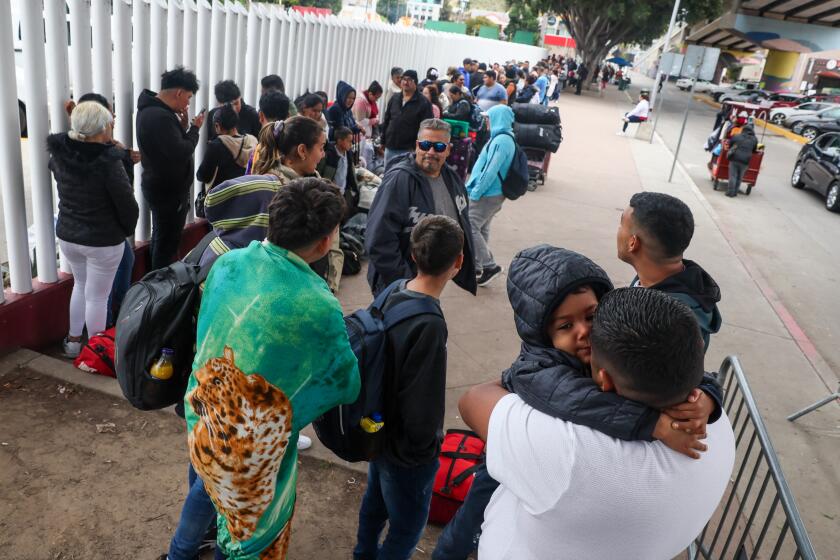A load of concern over Mexican trucks
When a big rig carrying explosive chemicals in Mexico blew up several weeks ago and killed more than two dozen, it set off alarms among critics of the Bush administration’s program to allow trucks from south of the border to move goods anywhere in the U.S.
Was an accident of this magnitude a sign of a dangerous, under-regulated Mexican safety system?
The Federal Motor Carrier Safety Administration, the U.S. agency that regulates big rigs, has been pushing for more than a year to open up U.S. highways to Mexican trucks delivering goods originating in Mexico. The U.S. promised this action under the North American Free Trade Agreement, which went into effect in 1993.
But it has evoked images of 18-wheel jalopies from Mexico blasting through American cities and making already dangerous highways even worse.
Because of its ports, its vast warehousing industry and its giant consumer market, Southern California is ground zero for such fears. So far, three Mexican trucking firms have been authorized to use U.S. highways, two of the firms from Baja California and the third across from the Texas border, in Nuevo León.
The fear that poorly trained Mexican truckers would jeopardize American lives may have some public appeal, but under the surface there are some problems with the argument.
The coalition that has fought the administration’s move is made up of groups that have different agendas: unions protecting jobs, the anti-immigration crowd protecting borders and highway safety groups.
On Sept. 6, a large group of Teamsters from Local 542 in San Diego held a rally to oppose the program, which the union has been doing ever since the inception of NAFTA, said Ken Lundgren, secretary treasurer of the local.
“We don’t believe they can comply with our standards,” Lundgren said. “A lot of people are trying to whitewash this issue. These trucks are in dilapidated condition.”
Lundgren asserts Mexican authorities don’t do enough criminal-background checks and drug testing of drivers. “There’s no way of checking how many hours they have been driving before reaching our border,” he adds.
And Lundgren said that ultimately an influx of Mexican trucks could jeopardize thousands of jobs currently held by Teamsters, even though the program specifically forbids Mexican trucking firms from hauling goods that originate and terminate within the U.S.
“Everybody is at risk,” declares Robert Shull, Public Citizen’s deputy director for auto safety. “There are all these promises and memorandums declaring that Mexican safety standards are equivalent, but they are not.
“They say they are going to inspect every truck every time it crosses the border. What that means is that they are going to be looking for a valid 90-day inspection sticker and a valid driver’s license,” he said.
The high-powered lobbying by such groups as the Teamsters and Public Citizen helped turn both California senators, Dianne Feinstein and Barbara Boxer, against the program.
Last month, the two Democrats joined a majority in Congress to vote in favor of blocking funds for the program, though whether that will ultimately keep Mexico’s trucks from U.S. highways is hardly certain. The pilot program was supposed to carefully select the very best Mexican trucking company to have open access across the U.S.
Eduardo Martinez, an economist at the Los Angeles Economic Development Corp., said the opponents have badly mischaracterized the Mexican trucking industry and tried to link this issue to immigration problems, national security risks and the drug trade. Instead, it is a simple economic trade issue.
As the Mexican economy grows, the U.S. is going to have to accept the ability of Mexican corporations to conduct their operations at international standards, Martinez said.
Martinez points to Orowheat, the premium bread sold in U.S. grocery stores. It is part of Mexico-based Grupo Bimbo, which has bakeries in both countries. If Americans can accept the safety of food delivered by a Mexican-based operation, why not trucks?
No doubt, Mexico has some trucks in lousy condition and some drivers who need to go back to driving school.
But you can be sure that Mexico does not have a monopoly on bad truck drivers or unsafe trucks.
I’d like to see Boxer and Feinstein take the same level of interest in the Long Beach Freeway, which is clogged with rundown rigs that service the massive ports in our harbor.
--
More to Read
Start your day right
Sign up for Essential California for news, features and recommendations from the L.A. Times and beyond in your inbox six days a week.
You may occasionally receive promotional content from the Los Angeles Times.







